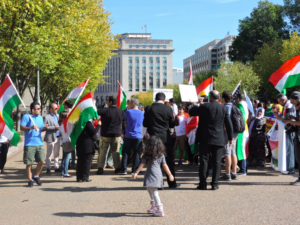By Natalie Boychuk
Travelling to Washington, D.C. twice over the 2017-2018 school year was a memorable experience. From listening to Congresswoman Debbie Dingell speak about the Zuckerberg trial, meeting Senator Bernie Sanders, and speaking with prominent members of the U.S. State Department, I feel like I gained a much clearer understanding of the American political system firsthand.
I was fortunate enough to have been granted the David M. Abshire award for my article, “Should I stay or should I go? United States Foreign Policy and Success for Secessionist Movements Abroad.” In this paper, I explore conditions for U.S. support for minority groups attempting to secede from their states. There is no framework under international law that determines the legitimacy of minority groups attempting to secede; however, some states, like Kosovo, have gained recognition by a majority of United Nations (UN) member states, allowing them to participate in international politics. Some scholars argue that in many cases, the success of the seceding state requires the recognition and/or intervention of great powers in order to be successful. The U.S. could arguably be the most important state in determining a seceding state’s legitimacy.
Support for secessionist movements by administrations throughout history has been inconsistent. While Woodrow Wilson’s Fourteen Points speech demonstrated U.S. recognition of the right to postcolonial secession, he also once argued for its limitation, saying that secession can have “potentially destabilizing consequences.” Assessing the Bangladesh and Kosovo cases, I argue that military and realist concerns always override moral obligations to intervene on behalf of a minority, except in cases where the harm against the minority is so great as to heighten tensions domestically.
I also analyzed the case of Kurdish secession from Iraq, which could potentially destabilize U.S. relations with Turkey. Using the Taiwan case as a model, I argue that a more nuanced approach that provides the Kurdish people with relative autonomy through material support without officially recognizing their independence could be useful in maintaining relations with Erdogan and continuing to fight the Islamic State in Iraq.
I am truly grateful to have received this award, but more so for the opportunity to be surrounded by such talented fellows from countries as far as South Africa, Japan, Spain, and Panama. I learned from a Spanish student about Catalonian secession and spoke to a Mexican fellow about similarities between U.S. and Mexican municipal systems. It was wonderful to exchange ideas with people who have different perspectives and lived experiences than we do here at PCJ.
This summer, my article will be published in the Centre for the Study of the Presidency and Congress’ Fellows Review with the other winning papers, which are on interesting topics ranging from U.S.-Chinese military competition, the impact of government inefficiencies on macroeconomic policy, and more! I encourage you to read the articles on the CSPC website: https://www.thepresidency.org.
Thank you to PCJ and CSPC for this opportunity!
